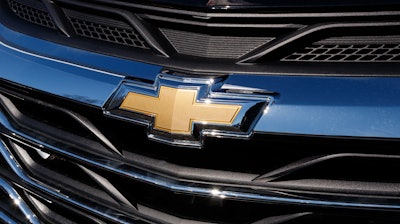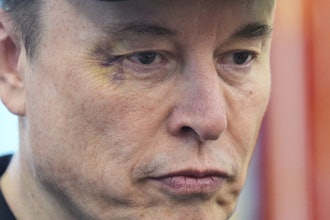
DETROIT (AP) — General Motors now says it will support efforts by the United Auto Workers union to organize employees at two U.S. electric vehicle battery factories that it's building in Ohio and Tennessee with a joint-venture partner.
The company's statement Tuesday about the plants departs from its past stance that the joint venture, called Ultium LLC, would decide on a bargaining strategy. But it falls into line with President Joe Biden's promise to create good-paying union jobs in the transition from combustion vehicles to electric.
It also comes after the UAW has made strong statements that Detroit-based GM and crosstown rival Ford have a “moral obligation” to pay top union wages at joint-venture battery plants. Experts say the union's future could be imperiled if it can't represent workers at the plants and get a top UAW wage of about $31 per hour. Those jobs will replace work that will be lost at combustion-engine and transmission factories.
However the conflict is resolved, it’s likely to chart the course of American manufacturing wages into the next decade.
“GM will build on a long history of supporting unions to promote safety, quality, training and well-paying jobs for American workers,” the statement said. “Both GM and Ultium Cells LLC respect workers’ right to unionize and the efforts of the UAW to organize battery cell manufacturing workers.”
GM spokesman Dan Flores would not comment beyond the statement about the battery plants in Lordstown, Ohio, and Spring Hill, Tennessee, which combined will employ about 2,300 workers. The other partner in Ultium LLC is South Korean battery maker LG Energy Solution.
The statement said that the UAW has a historic and constructive relationship with the auto industry, and “would be well positioned to represent the workforce.”
Last week Ford announced that it would form a joint venture and build two North American factories to make batteries for roughly 600,000 electric vehicles per year by the middle of this decade.
The deal with battery maker SK Innovation of South Korea set up the same confrontation that the union has with GM over UAW representation and union wages at the plants.
The UAW and Biden have advocated for union jobs in new factories as the country transitions from gasoline-burning vehicles to those powered by electricity. The issue almost certainly will be part of negotiations on a new UAW national contract in 2023.
In a statement Tuesday, UAW Vice President for GM Terry Dittes said the union looks forward to discussions “so workers will have a voice at the table in order to create good paying union jobs and benefits.”
Guidehouse Insights analyst Sam Abuelsamid said the GM stance is not surprising because workers at previous joint-venture factories have always been represented by the union.
GM probably didn't support the union at first in order to pressure it to take lower wages at the joint-venture plants.
When the Lordstown plant was announced in 2019, GM CEO Mary Barra said worker pay would follow GM’s component-manufacturing strategy, where workers are paid less than top union wages. She said the plant would have to be cost-competitive.
At a GM plant assembling batteries in Brownstown Township, Michigan, the union agreed in 2009 to $15 to $17 per hour wages to assemble battery packs for the now-canceled Chevrolet Volt hybrid gas-electric vehicle. GM also pays about $22.50 per hour at union-represented parts manufacturing plants.
Biden wants to replace all internal combustion vehicles with battery-electrics, and he plans to spend billions to offer tax credits and rebates to get people to switch. The strategy is a key component of his plan to fight climate change by cutting U.S. greenhouse gas emissions at least in half by 2030, as well as create “good-paying union jobs” in a clean-energy economy.
But the UAW, which represents about 150,000 U.S. workers at Ford, General Motors and Stellantis (formerly Fiat Chrysler), fears that automakers will try to use joint ventures to pay lower wages.
Currently auto companies contract with parts suppliers to make electric vehicle batteries, and those factories pay far less than what top UAW workers make at auto plants. Union workers fear that as the country moves to electric vehicles, thousands of jobs making gasoline engines and transmissions will be replaced by lower-paying battery work.
The union also says government electric vehicle incentives should be tied to U.S. jobs with access to unions.
Ford spokeswoman Kelli Felker deferred to previous company statements about its joint venture, called BlueOvalSK. Ford said the labor strategy would be determined by the joint venture when it is set up later this summer.






















